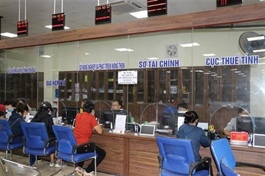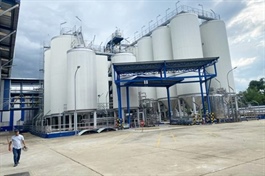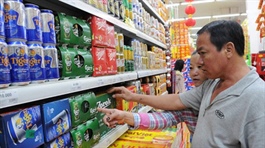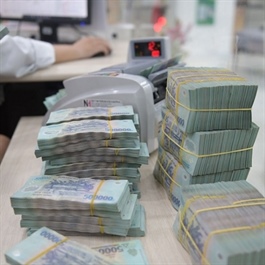Exchange rate remains 2024 theme
Exchange rate remains 2024 theme
A surge in Vietnam’s exchange rate has posed challenges for businesses due to rising input costs and currency fluctuations.

In the early months of the year, Vietnam’s exchange rate surged nearly 5 per cent, prompting the State Bank of Vietnam to implement various interbank market tools and sell spot foreign currency. The exchange rate hovers around its intervention level of VND25,450/USD as of last week.
Associate Professor Dr. Nguyen Huu Huan, head of Financial Markets at the University of Economics in Ho Chi Minh City, told VIR that inflation and exchange rates were the main economic themes for Vietnam in 2024. “We anticipate two more periods of exchange rate tension, around August-September and December,” he said. “Exchange rates are seasonal, often spiking due to high import volumes, including smuggling.”
Despite the rapid rise in the USD/VND exchange rate since the beginning of the year, market watchdogs are optimistic about a more stable second half as export growth resumes.
“In May, Vietnam experienced a trade deficit mainly due to imports of raw materials for production. This trade deficit is expected to turn into a surplus in the coming months as these materials are manufactured and exported,” Huan said.
However, he pointed out a challenge: exporters are currently holding USD instead of selling, waiting for higher rates. “This behaviour affects the exchange rate significantly, even with a trade surplus, as the cash flow does not return, impacting Vietnam’s balance of payments. Managing this issue is complex,” Huan added.
He believed that interest rates will continue to exert pressure on the exchange rate in the coming months. “If interest rates do not increase, foreign investors might continue selling off, putting more pressure on the exchange rate,” he said.
He suggested allowing the VND to fluctuate within a broader band than the current 5 per cent to alleviate some market pressure. Additionally, he recommended finding ways to encourage exporters to repatriate their foreign currency earnings.
The adverse impacts of exchange rate fluctuations are not limited to macroeconomic indicators. They significantly affect various industries.
Cao Thuc Uy, director of Cao Phat Company in the southern province of Ba Ria-Vung Tau, said that the cashew industry is facing numerous challenges. This year, prolonged drought has significantly reduced cashew production in several African countries, leading to increased costs for Vietnam.
“They are demanding payments at prices much higher than those stipulated in existing contracts. Currently, the price of raw cashew nuts has surged by 40-50 per cent compared to the beginning of the year,” Uy stated.
He explained that as input costs rise, the high exchange rate exacerbates financial burdens for businesses. “Since the start of 2024, the exchange rate has increased by approximately 5 per cent. For every tonne of raw cashew nuts, priced between $1,500 and $1,600, companies now incur an additional $75 due to the higher exchange rate,” he said. “If a shipment of raw materials imports hundreds of tonnes of cashews, businesses lose several dozens of thousands of US dollars due to exchange rate differences.”
According to the Vietnam Cashew Association, Vietnam spent nearly $3.2 billion last year to import about 2.7 million tonnes of raw cashew nuts. As of mid-June, this figure reached about $1.6 billion.
“The simultaneous sharp rises in exchange rates, shipping fees, and raw material prices have left cashew businesses on edge, with many reporting significant losses,” said an association representative. This scenario is not unique to the cashew industry. Many companies in the seafood, textile, wood, and fertiliser sectors are also significantly affected.
For instance, Vinh Hoan Corporation and Nam Viet Corporation both reported losses in the first quarter due to exchange rate discrepancies.
Phan Thi Thanh Xuan, vice chairwoman of the Vietnam Leather, Footwear, and Handbag Association, said, “A stronger USD benefits exporters, but many Vietnamese exporters rely on imported raw materials, which increases their costs and risks with a higher exchange rate.”
The General Statistics Office reported that in the first half of the year, Vietnam’s total import-export turnover was estimated at $368.5 billion, up 15.7 per cent on-year. Exports reached $190 billion, up 14.5 per cent, while imports hit $178.5 billion, up 17 per cent.
Dr. Le Xuan Nghia, a member of the National Financial and Monetary Policy Advisory Council, pointed out that the significant increase in imports, even resulting in occasional trade deficits, indicates economic recovery. “Businesses are ramping up imports of machinery and raw materials to meet consumer demand and boost exports,” he said.
While the rising exchange rate poses some challenges for importers, Nghia believes the 5 per cent increase in the VND/USD rate since the beginning of the year is reasonable. “The exchange rate pressure is not excessively high given that inflation remains under control and the trade surplus is substantial,” he said
Tran Ngoc Bau, CEO of WiGroup, remarked that the exchange rate pressure might ease towards the year’s end. “Initially, the target was a 2-3 per cent depreciation, but it may need to be adjusted. Keeping the exchange rate stable until the end of the year would be a success,” he said.
According to last week’s report from UOB on Q2 economic growth, it forecasts a recovery of the VND in the second half of 2024, as external pressure from the USD diminishes ahead of the Fed’s anticipated rate cuts in September. The UOB also expects the central to maintain the current policy rates through 2024.



























